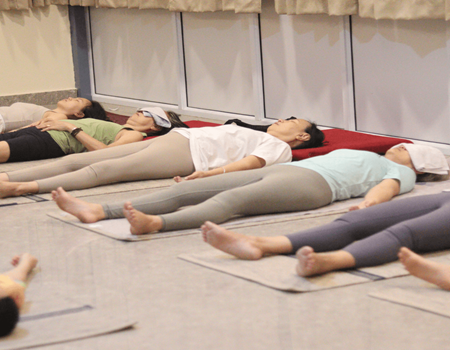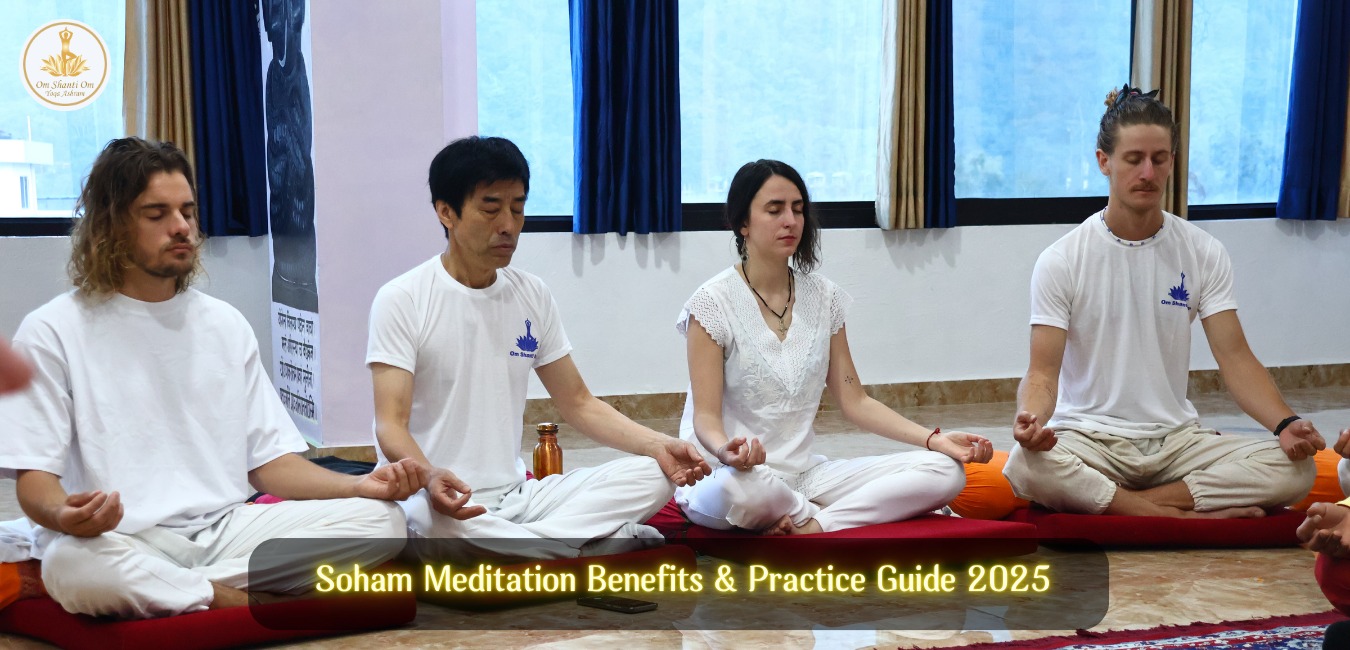In today’s busy life, many people eat unhealthy food and follow stressful routines, which affects their health and well-being. Yoga offers a wonderful way to bring balance to the body, mind, and soul. It’s not just about doing physical exercises — yoga is a complete lifestyle that focuses on living with awareness, health, and harmony. One important part of living a yogic lifestyle is taking care of your nutrition. What you eat plays a big role in your energy, focus, and overall growth during your yoga journey.
If you are preparing for your yoga teacher training at Om Shanti Om Yoga in Rishikesh, it's important to realize that what you eat can really make a difference in your practice, endurance, and mental focus. Just like yoga teaches you to be aware of your movements and breath, it also teaches you to be aware of what you eat. In this blog, we will walk you through some key nutrition tips for your yoga teacher training program to enable you to reap the most from your transformational journey.
The Deep Connection Between Yoga and Nutrition
To begin with, let's discuss why nutrition is important for yoga students, particularly for intensive teacher training courses.
- Energy Levels:- Yoga demands strength, flexibility, and stamina. A well-balanced, nutrient-dense diet gives your body the energy it requires to maintain long practice hours, meditation, and learning.
- Mental Clarity:- Yoga is not simply physical; it is highly mental and spiritual. Eating clean, wholesome foods can clear your mind, soothe your brain, and enhance more profound meditation periods.
- Internal Purification:- Yoga induces cleansing and purification from within. This is accompanied by a wholesome diet that nourishes digestion, cleanses the organs, and stimulates immunity.
- Emotional Balance:- Incroyable as it may sound, food influences your moods. Natural, fresh foods elevate your mood, while heavy foods and processed foods leave you tired and cranky.
Knowing how deeply yoga and nutrition are connected, you can better realize that taking care of your body in a conscious manner is an extension of your yoga training itself.
Read Also: 10 Benefits of 200 Hour YTT in Rishikesh
Essential Nutrition Tips for Your 200 Hour Yoga Teacher Training Journey
Here are some important nutrition tips that can serve your mind, body, and spirit, during your training:
- Adopt a Plant-Based Diet:- Though you don't necessarily have to turn into a vegetarian, plant-based food is highly suggested during yoga teacher training. Fresh vegetables, fruits, legumes, seeds, and nuts give your body the necessary vitamins, minerals, fiber, and antioxidants that enhance recovery and energy levels.
Spinach, kale, broccoli, carrots, sweet potatoes, bananas, berries, and avocados can become your new friends during this time. - Go for Whole Grains Instead of Refined Carbs:- Replace processed grains such as white rice or white bread with whole grains like brown rice, quinoa, oats, and millet. Whole grains are slow-digesting carbohydrates that give a gradual release of energy, avoiding blood sugar spikes and dips that can disrupt your yoga practice.
- Hydrate Mindfully:- Water is life, particularly when you are physically active during training. Begin your day with warm water, and do not forget to hydrate before and after taking your yoga classes. Herbal teas, coconut water, and fresh vegetable juices may also be included to help with electrolyte balance.
Dehydration leads to fatigue, headache, and muscle cramping—everything you do not want to happen to you during training! - Add Healthy Fats:- Healthy fats support joint health, brain health, and long-term energy. Take in foods such as avocados, olive oil, flaxseeds, chia seeds, walnuts, and almonds in your diet. These foods fuel your body and speed up the recovery process after rigorous yoga sessions.
- Prioritize Light and Digestible Meals:- Consumption of greasy, heavy food makes you feel lethargic and uneasy while doing yoga. Practice light, easily digestible food, particularly prior to classes. Smoothies, soups, salads, and lightly steamed vegetables with grains are some acceptable options.
- Timing Matters:- Try to finish your meals at least 2–3 hours prior to your practice. Practicing yoga with a full stomach will result in discomfort, bloating, as well as nausea. In case you are feeling hungry prior to practice, a light snack such as a banana, a serving of nuts, or a smoothie can provide you with a gentle energy boost.
- Respect Your Unique Body Needs:- Each person is unique. Some may do well with three meals a day, while others may require several small meals. Tune in to your body's signals. It's not about adhering to a strict diet but about developing mindful, intuitive eating patterns that support your yoga teacher training practice.
Foods to Eat During Your 200 Hour Yoga Teacher Training
Here’s a quick guide to foods that can be your nutritional companions during your training:
- Fruits:- Bananas, apples, berries, oranges, papaya, and mangoes are packed with natural sugars, fiber, and essential vitamins. They provide quick energy boosts and support your immune system, making them perfect snacks before or after practice.
- Vegetables:- Leafy greens, carrots, beets, sweet potatoes, and cucumbers are high in fiber, antioxidants, and minerals. They detoxify the body, aid in digestion, and make you feel light and healthy during your practice.
- Whole Grains:- Brown rice, quinoa, oats, and barley are rich sources of sustained energy. They give out energy gradually and are high in fiber, which aids in digestion and sustains strength over a long practice day.
- Legumes:- Lentils, chickpeas, and mung beans are potent plant-based protein foods. They support recovery of the muscles and offer sustained fullness, making them perfect for replenishing post-training meals.
- Nuts and Seeds:- Almonds, walnuts, chia seeds, flaxseeds, and pumpkin seeds offer healthy fats, protein, and essential nutrients. A small handful is a perfect, energizing snack between classes.
- Plant-Based Proteins:- Tofu, tempeh, edamame, and peas are high in protein and minerals. They repair muscles and give sustained energy without being heavy.
- Superfoods:- Spirulina, moringa, or amla powder added to smoothies or food can increase your nutrient levels. Superfoods are loaded with antioxidants and support recovery and overall energy.
- Healthy Beverages:- Stay hydrated with herbal teas, coconut water, and lemon water. These beverages help replenish lost minerals, support digestion, and keep your energy levels balanced throughout the day.
Also go through:- How to Choose the Right 200 Hour YTT Program?
Foods to Avoid During Your Yoga Journey
Just as some foods nourish you, others can drain your energy and hinder your yoga practice. Here are some foods and substances to avoid or minimize:
- Processed Foods: Chips, packaged snacks, sugary cereals, ready-to-eat meals.
- Caffeine: Restrict coffee and high caffeinated teas, as they lead to restlessness.
- Sugar and Sweets: Too much sugar leads to energy crashes and inflammation.
- Heavy Animal Products: Red meats and heavy dairy are difficult to digest.
- Alcohol: It dehydrates your body and dulls mental clarity.
By being aware of these options, you set up an open, fresh space within your body—just right for enhancing your yoga practice.
Final Thoughts
Nutrition is not a separate entity from yoga; it is an essential pillar that supports your physical, mental, and spiritual growth. As you embark on your 200 hour yoga teacher training journey at Om Shanti Om Yoga, remember that what you put on your plate is just as important as what you practice on the mat.
By eating clean, fresh, and wholesome foods, staying hydrated, and avoiding harmful substances, you will not only fuel your body but also nurture a peaceful, focused, and energetic mind. Take care of your body with good food and healthy habits, and it will support you throughout your yoga teacher training journey.
























0 Comments
No comments yet. Be the first to comment!